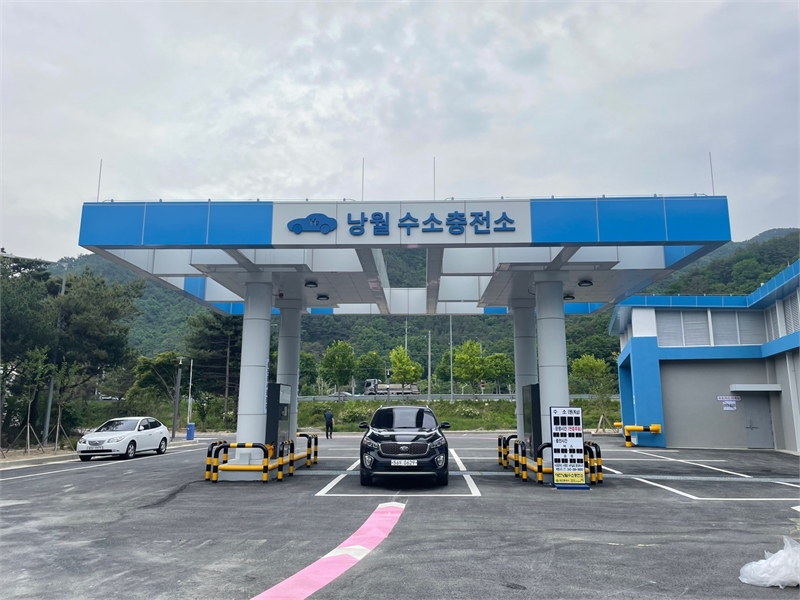
내달부터 대전 공영 수소충전소 3곳(학하·신대·낭월)의 수소 판매단가가 현행 9600원/kg에서 1만200원/kg으로 인상된다. 2025. 11. 17
◆12월부터 kg당 1만200원 적용
대전시는 12월부터 공영 수소충전소 3곳(학하·신대·낭월)의 수소 판매단가를 현행 9600원/kg에서 600원(6.3%) 인상한 1만200원/kg으로 조정한다고 17일 밝혔다. 인상 조치는 2023년 2월 9600원으로 조정된 이후 2년 10개월 만이다. 대전시는 수소구매비용 증가 등 운영원가 상승으로 공영 수소충전소의 경영부담이 가중됨에 따라 전국 17개 시·도 가운데 최저 수준인 판매단가를 전국 평균 수준으로 조정한다는 입장이다. 이번 인상으로 수소승용차(넥쏘) 기준 1회 충전당 2400원(4kg)~3600원(6kg)의 추가비용이 소요된다. 동급 휘발유 차량과 비교해도 약 3만원 가량 저렴할 것으로 예상된다.
◆자체 수소공급망 확보 추진
대전시는 수소 판매단가 인상과 별개로 안정적인 자체 수소공급망 확보에도 노력을 기울일 예정이다. 현재 수소충전소에서 사용하는 수소 원료는 대부분 서산, 여수, 울산 등 대규모 석유화학단지 내 석유정제과정에서 발생한 부생수소를 튜브트레일러를 통해 원거리로 공급받고 있다. 700bar 이상의 고압으로 압축 후 수소차에 충전하고 있다. 기존 원거리 부생수소 의존도를 낮추기 위해 대전시는 2023년 9월부터 가동 중인 낭월 수소생산시설 내 수소출하시설 구축에 필요한 규제 개선 사항을 중앙정부에 지속 건의해 자체 수소 수급능력을 강화할 계획이다. 대전시는 기후에너지환경부의 '수소충전소 연료구입비 지원사업'을 통해 공영 수소충전소 운영 적자에 대해 지속적으로 국비 지원을 받을 수 있도록 노력할 예정이다.
◆수소모빌리티 보급 특·광역시 중 2위
권경민 대전시 경제국장은 "공영 수소충전소의 누적된 운영 적자 개선을 위해 부득이 수소 판매단가를 인상하는 점에 대해 시민 여러분들의 많은 이해를 바란다"며 "공영 수소충전소가 수소차 이용자의 수소 충전을 안정적으로 지원해 수송부문 대기환경 개선에 대전시가 앞장설 것"이라고 말했다. 대전시는 관내 수소충전소 8곳(공영 3, 민간 5)를 운영하고 있다. 현재까지 수소승용차, 수소버스 등 수소모빌리티를 2086대 보급 완료했다. 이는 인구수 대비 전국 특·광역시 중 2위에 해당하는 규모다.
최보경 기자
영문 기사
아래는 위 기사를 '구글 번역'으로 번역한 영문 기사의 [전문]입니다. 영문 번역에 오류가 있을 수 있음을 전제로 합니다.
Daejeon City Raises Public Hydrogen Station Prices by 6.3%...To 10,200 Won
600 Won Increase After 2 Years 10 Months...Reflecting Rising Operating Costs
◆10,200 Won per kg Applied from December
Daejeon City announced on the 17th that it will adjust the hydrogen sales price at three public hydrogen charging stations (Hakha, Shindae, Nangwol) from the current 9,600 won/kg to 10,200 won/kg, an increase of 600 won (6.3%) starting in December. This increase comes 2 years and 10 months after the adjustment to 9,600 won in February 2023. Daejeon City's position is to adjust the sales price, which is the lowest among 17 cities and provinces nationwide, to the national average level as the management burden on public hydrogen charging stations has increased due to rising operating costs including increased hydrogen purchase costs. This increase will require additional costs of 2,400 won (4kg) to 3,600 won (6kg) per charging for hydrogen passenger cars (Nexo). It is expected to be about 30,000 won cheaper compared to gasoline vehicles of the same class.
◆Promoting Independent Hydrogen Supply Chain
Daejeon City plans to make efforts to secure a stable independent hydrogen supply chain separately from the hydrogen sales price increase. Currently, the hydrogen raw material used at hydrogen charging stations is mostly byproduct hydrogen generated during the oil refining process in large petrochemical complexes such as Seosan, Yeosu, and Ulsan, supplied from long distances through tube trailers. It is compressed to high pressure of 700 bar or higher before charging hydrogen vehicles. To reduce dependence on existing long-distance byproduct hydrogen, Daejeon City plans to strengthen its independent hydrogen supply capacity by continuously proposing regulatory improvements necessary for building hydrogen shipping facilities within the Nangwol hydrogen production facility that has been operating since September 2023 to the central government. Daejeon City plans to make efforts to continuously receive national funding for public hydrogen charging station operating deficits through the Ministry of Climate, Energy and Environment's 'Hydrogen Station Fuel Purchase Cost Support Project.'
◆Second in Hydrogen Mobility Distribution Among Metropolitan Cities
Kwon Kyung-min, Director of Daejeon City's Economic Bureau, said "We ask for citizens' understanding regarding the unavoidable increase in hydrogen sales prices to improve the accumulated operating deficit of public hydrogen charging stations," adding "Daejeon City will take the lead in improving the air environment in the transportation sector by stably supporting hydrogen charging for hydrogen vehicle users through public hydrogen charging stations." Daejeon City operates 8 hydrogen charging stations (3 public, 5 private) in the jurisdiction. So far, 2,086 hydrogen mobility units including hydrogen passenger cars and hydrogen buses have been distributed. This is the second largest scale among special and metropolitan cities nationwide in proportion to population.
Choi Bo-kyung, Reporter